Corporate Social Responsibility on Corporate Tax and Investment Decisions.
VerifiedAdded on 2022/08/18
|11
|2910
|14
AI Summary
Quote for assignment 1
Contribute Materials
Your contribution can guide someone’s learning journey. Share your
documents today.
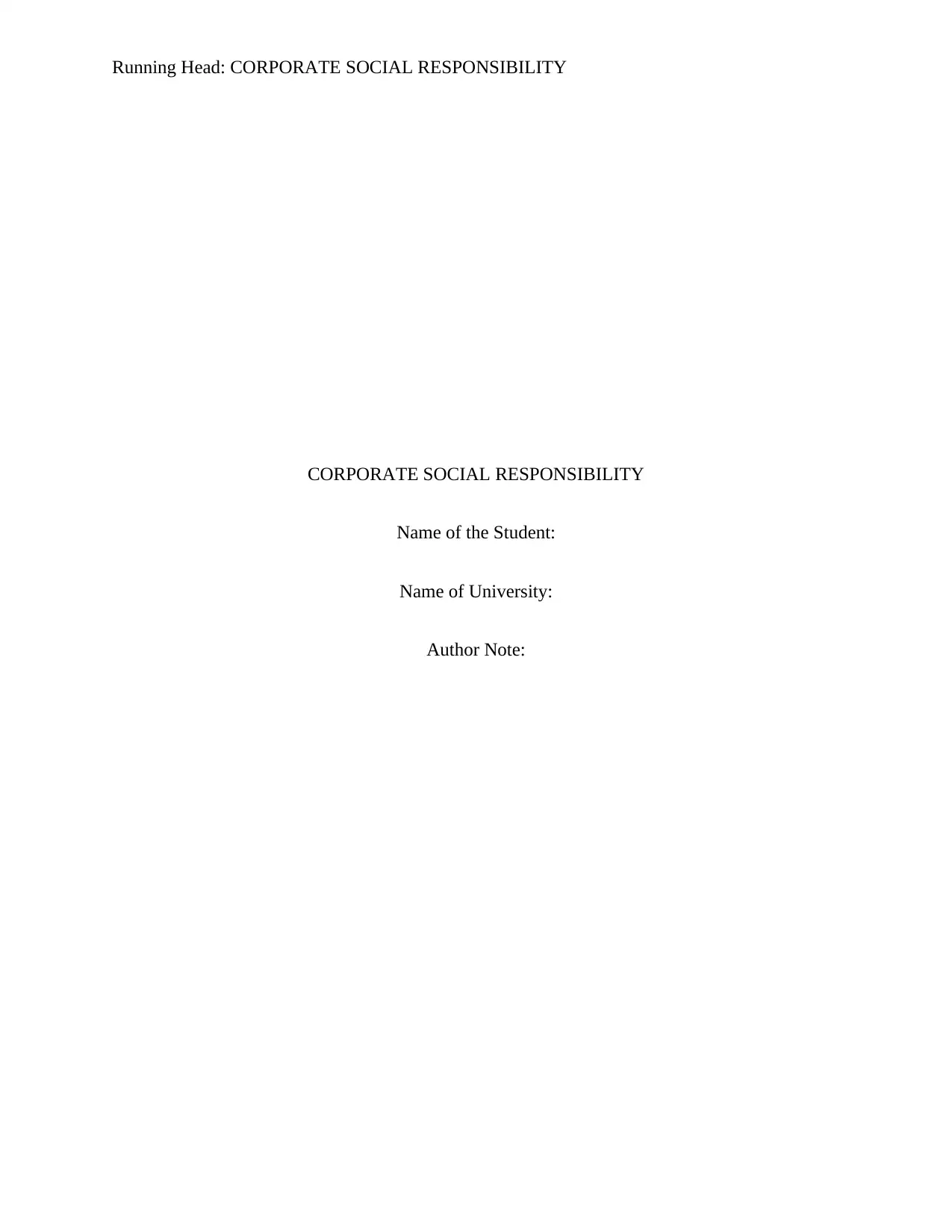
Running Head: CORPORATE SOCIAL RESPONSIBILITY
CORPORATE SOCIAL RESPONSIBILITY
Name of the Student:
Name of University:
Author Note:
CORPORATE SOCIAL RESPONSIBILITY
Name of the Student:
Name of University:
Author Note:
Secure Best Marks with AI Grader
Need help grading? Try our AI Grader for instant feedback on your assignments.
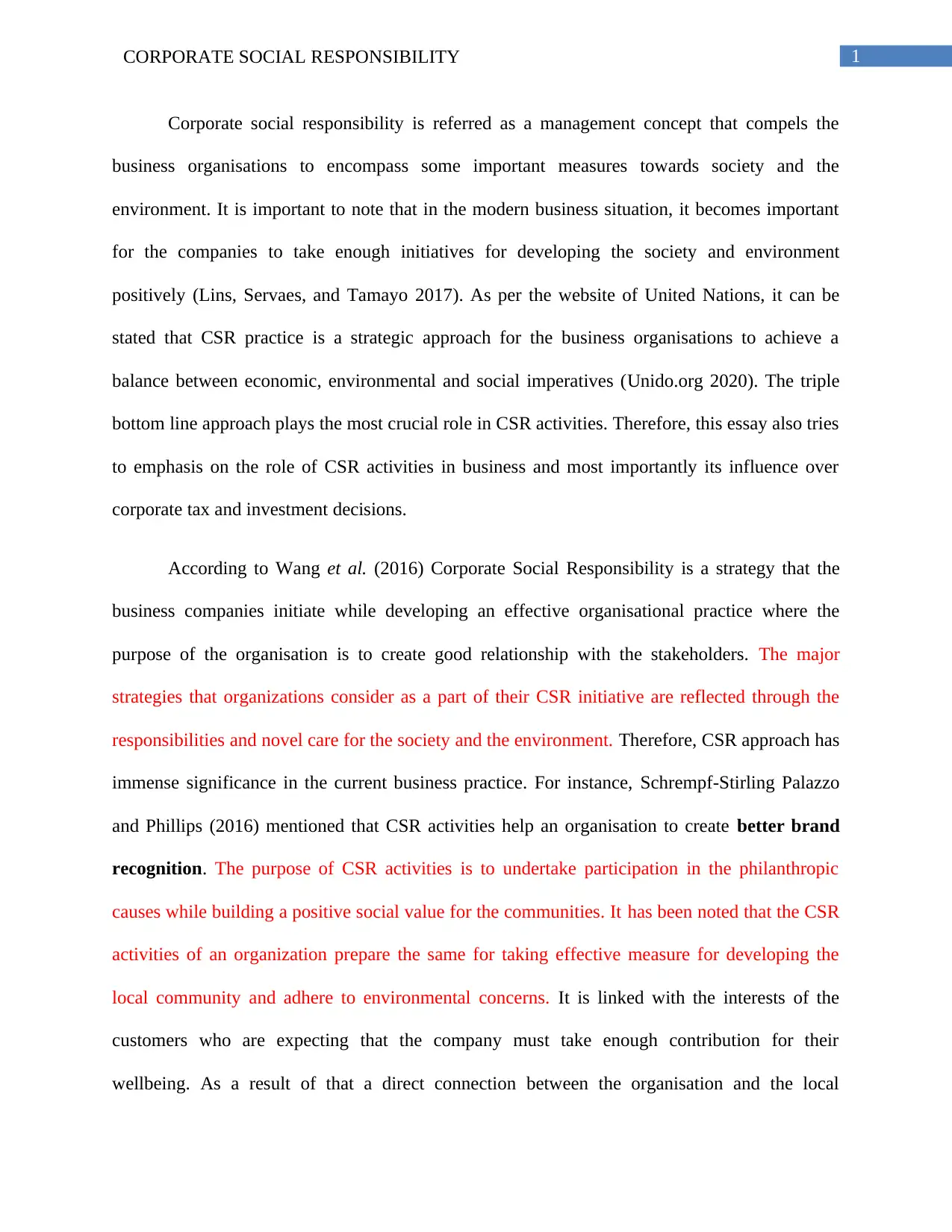
CORPORATE SOCIAL RESPONSIBILITY 1
Corporate social responsibility is referred as a management concept that compels the
business organisations to encompass some important measures towards society and the
environment. It is important to note that in the modern business situation, it becomes important
for the companies to take enough initiatives for developing the society and environment
positively (Lins, Servaes, and Tamayo 2017). As per the website of United Nations, it can be
stated that CSR practice is a strategic approach for the business organisations to achieve a
balance between economic, environmental and social imperatives (Unido.org 2020). The triple
bottom line approach plays the most crucial role in CSR activities. Therefore, this essay also tries
to emphasis on the role of CSR activities in business and most importantly its influence over
corporate tax and investment decisions.
According to Wang et al. (2016) Corporate Social Responsibility is a strategy that the
business companies initiate while developing an effective organisational practice where the
purpose of the organisation is to create good relationship with the stakeholders. The major
strategies that organizations consider as a part of their CSR initiative are reflected through the
responsibilities and novel care for the society and the environment. Therefore, CSR approach has
immense significance in the current business practice. For instance, Schrempf-Stirling Palazzo
and Phillips (2016) mentioned that CSR activities help an organisation to create better brand
recognition. The purpose of CSR activities is to undertake participation in the philanthropic
causes while building a positive social value for the communities. It has been noted that the CSR
activities of an organization prepare the same for taking effective measure for developing the
local community and adhere to environmental concerns. It is linked with the interests of the
customers who are expecting that the company must take enough contribution for their
wellbeing. As a result of that a direct connection between the organisation and the local
Corporate social responsibility is referred as a management concept that compels the
business organisations to encompass some important measures towards society and the
environment. It is important to note that in the modern business situation, it becomes important
for the companies to take enough initiatives for developing the society and environment
positively (Lins, Servaes, and Tamayo 2017). As per the website of United Nations, it can be
stated that CSR practice is a strategic approach for the business organisations to achieve a
balance between economic, environmental and social imperatives (Unido.org 2020). The triple
bottom line approach plays the most crucial role in CSR activities. Therefore, this essay also tries
to emphasis on the role of CSR activities in business and most importantly its influence over
corporate tax and investment decisions.
According to Wang et al. (2016) Corporate Social Responsibility is a strategy that the
business companies initiate while developing an effective organisational practice where the
purpose of the organisation is to create good relationship with the stakeholders. The major
strategies that organizations consider as a part of their CSR initiative are reflected through the
responsibilities and novel care for the society and the environment. Therefore, CSR approach has
immense significance in the current business practice. For instance, Schrempf-Stirling Palazzo
and Phillips (2016) mentioned that CSR activities help an organisation to create better brand
recognition. The purpose of CSR activities is to undertake participation in the philanthropic
causes while building a positive social value for the communities. It has been noted that the CSR
activities of an organization prepare the same for taking effective measure for developing the
local community and adhere to environmental concerns. It is linked with the interests of the
customers who are expecting that the company must take enough contribution for their
wellbeing. As a result of that a direct connection between the organisation and the local
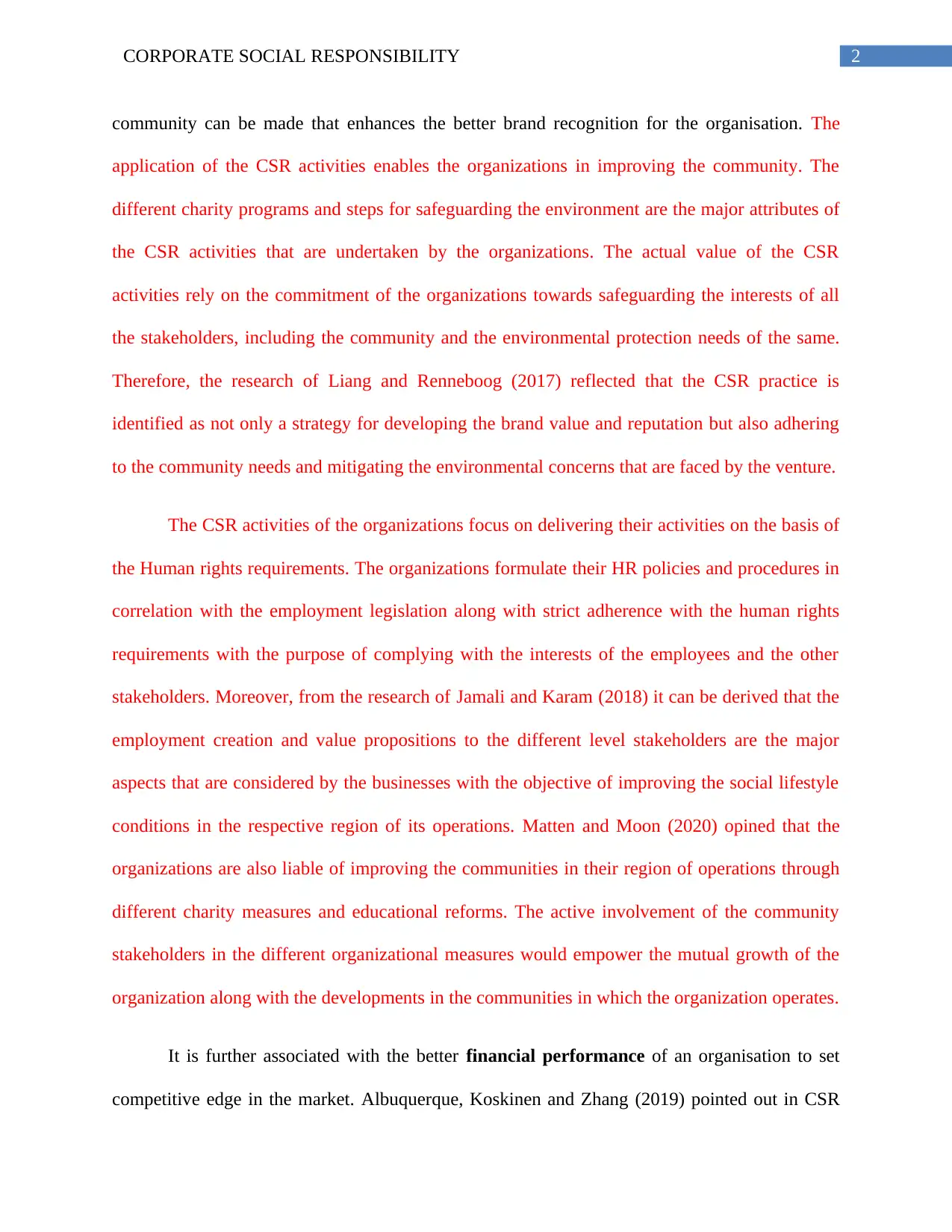
2CORPORATE SOCIAL RESPONSIBILITY
community can be made that enhances the better brand recognition for the organisation. The
application of the CSR activities enables the organizations in improving the community. The
different charity programs and steps for safeguarding the environment are the major attributes of
the CSR activities that are undertaken by the organizations. The actual value of the CSR
activities rely on the commitment of the organizations towards safeguarding the interests of all
the stakeholders, including the community and the environmental protection needs of the same.
Therefore, the research of Liang and Renneboog (2017) reflected that the CSR practice is
identified as not only a strategy for developing the brand value and reputation but also adhering
to the community needs and mitigating the environmental concerns that are faced by the venture.
The CSR activities of the organizations focus on delivering their activities on the basis of
the Human rights requirements. The organizations formulate their HR policies and procedures in
correlation with the employment legislation along with strict adherence with the human rights
requirements with the purpose of complying with the interests of the employees and the other
stakeholders. Moreover, from the research of Jamali and Karam (2018) it can be derived that the
employment creation and value propositions to the different level stakeholders are the major
aspects that are considered by the businesses with the objective of improving the social lifestyle
conditions in the respective region of its operations. Matten and Moon (2020) opined that the
organizations are also liable of improving the communities in their region of operations through
different charity measures and educational reforms. The active involvement of the community
stakeholders in the different organizational measures would empower the mutual growth of the
organization along with the developments in the communities in which the organization operates.
It is further associated with the better financial performance of an organisation to set
competitive edge in the market. Albuquerque, Koskinen and Zhang (2019) pointed out in CSR
community can be made that enhances the better brand recognition for the organisation. The
application of the CSR activities enables the organizations in improving the community. The
different charity programs and steps for safeguarding the environment are the major attributes of
the CSR activities that are undertaken by the organizations. The actual value of the CSR
activities rely on the commitment of the organizations towards safeguarding the interests of all
the stakeholders, including the community and the environmental protection needs of the same.
Therefore, the research of Liang and Renneboog (2017) reflected that the CSR practice is
identified as not only a strategy for developing the brand value and reputation but also adhering
to the community needs and mitigating the environmental concerns that are faced by the venture.
The CSR activities of the organizations focus on delivering their activities on the basis of
the Human rights requirements. The organizations formulate their HR policies and procedures in
correlation with the employment legislation along with strict adherence with the human rights
requirements with the purpose of complying with the interests of the employees and the other
stakeholders. Moreover, from the research of Jamali and Karam (2018) it can be derived that the
employment creation and value propositions to the different level stakeholders are the major
aspects that are considered by the businesses with the objective of improving the social lifestyle
conditions in the respective region of its operations. Matten and Moon (2020) opined that the
organizations are also liable of improving the communities in their region of operations through
different charity measures and educational reforms. The active involvement of the community
stakeholders in the different organizational measures would empower the mutual growth of the
organization along with the developments in the communities in which the organization operates.
It is further associated with the better financial performance of an organisation to set
competitive edge in the market. Albuquerque, Koskinen and Zhang (2019) pointed out in CSR
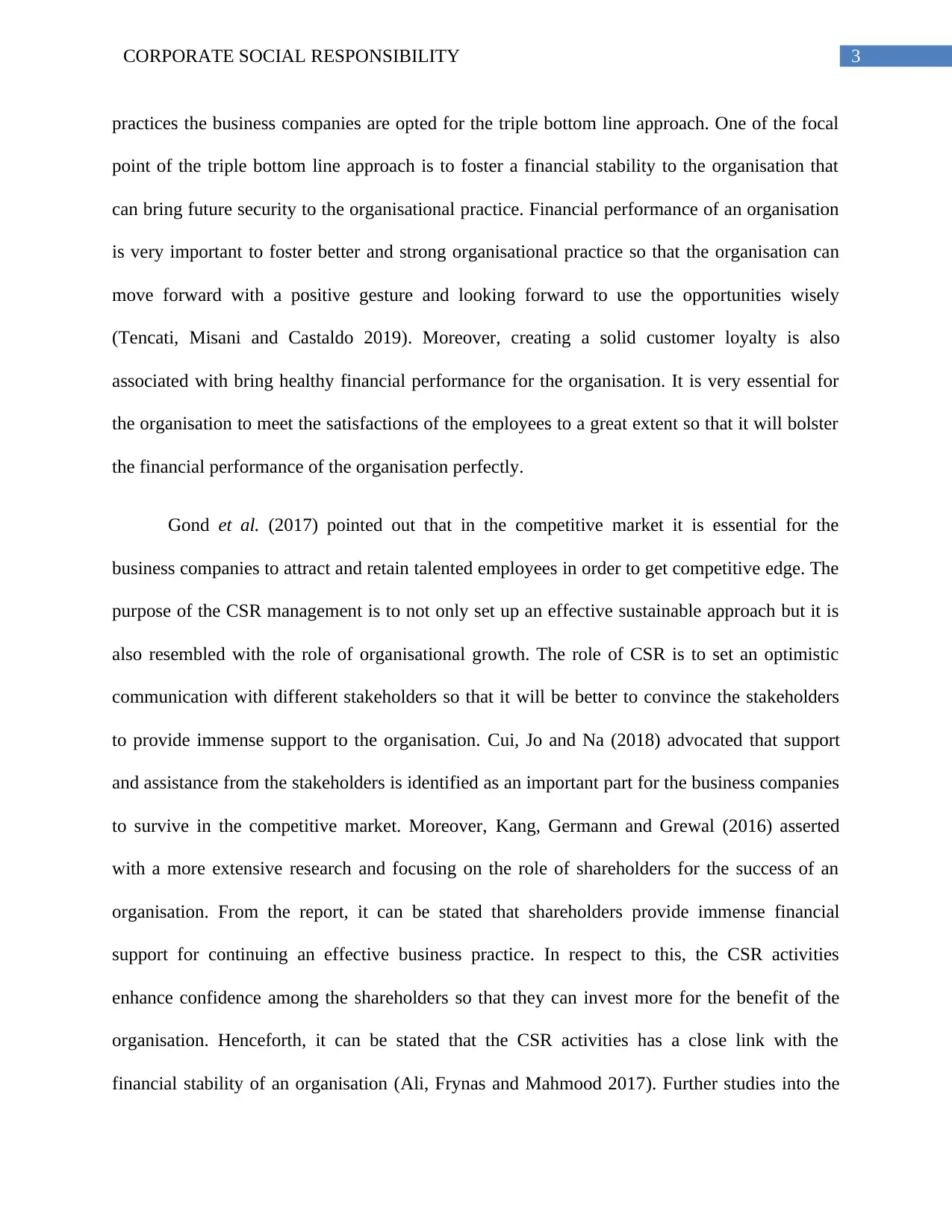
3CORPORATE SOCIAL RESPONSIBILITY
practices the business companies are opted for the triple bottom line approach. One of the focal
point of the triple bottom line approach is to foster a financial stability to the organisation that
can bring future security to the organisational practice. Financial performance of an organisation
is very important to foster better and strong organisational practice so that the organisation can
move forward with a positive gesture and looking forward to use the opportunities wisely
(Tencati, Misani and Castaldo 2019). Moreover, creating a solid customer loyalty is also
associated with bring healthy financial performance for the organisation. It is very essential for
the organisation to meet the satisfactions of the employees to a great extent so that it will bolster
the financial performance of the organisation perfectly.
Gond et al. (2017) pointed out that in the competitive market it is essential for the
business companies to attract and retain talented employees in order to get competitive edge. The
purpose of the CSR management is to not only set up an effective sustainable approach but it is
also resembled with the role of organisational growth. The role of CSR is to set an optimistic
communication with different stakeholders so that it will be better to convince the stakeholders
to provide immense support to the organisation. Cui, Jo and Na (2018) advocated that support
and assistance from the stakeholders is identified as an important part for the business companies
to survive in the competitive market. Moreover, Kang, Germann and Grewal (2016) asserted
with a more extensive research and focusing on the role of shareholders for the success of an
organisation. From the report, it can be stated that shareholders provide immense financial
support for continuing an effective business practice. In respect to this, the CSR activities
enhance confidence among the shareholders so that they can invest more for the benefit of the
organisation. Henceforth, it can be stated that the CSR activities has a close link with the
financial stability of an organisation (Ali, Frynas and Mahmood 2017). Further studies into the
practices the business companies are opted for the triple bottom line approach. One of the focal
point of the triple bottom line approach is to foster a financial stability to the organisation that
can bring future security to the organisational practice. Financial performance of an organisation
is very important to foster better and strong organisational practice so that the organisation can
move forward with a positive gesture and looking forward to use the opportunities wisely
(Tencati, Misani and Castaldo 2019). Moreover, creating a solid customer loyalty is also
associated with bring healthy financial performance for the organisation. It is very essential for
the organisation to meet the satisfactions of the employees to a great extent so that it will bolster
the financial performance of the organisation perfectly.
Gond et al. (2017) pointed out that in the competitive market it is essential for the
business companies to attract and retain talented employees in order to get competitive edge. The
purpose of the CSR management is to not only set up an effective sustainable approach but it is
also resembled with the role of organisational growth. The role of CSR is to set an optimistic
communication with different stakeholders so that it will be better to convince the stakeholders
to provide immense support to the organisation. Cui, Jo and Na (2018) advocated that support
and assistance from the stakeholders is identified as an important part for the business companies
to survive in the competitive market. Moreover, Kang, Germann and Grewal (2016) asserted
with a more extensive research and focusing on the role of shareholders for the success of an
organisation. From the report, it can be stated that shareholders provide immense financial
support for continuing an effective business practice. In respect to this, the CSR activities
enhance confidence among the shareholders so that they can invest more for the benefit of the
organisation. Henceforth, it can be stated that the CSR activities has a close link with the
financial stability of an organisation (Ali, Frynas and Mahmood 2017). Further studies into the
Secure Best Marks with AI Grader
Need help grading? Try our AI Grader for instant feedback on your assignments.
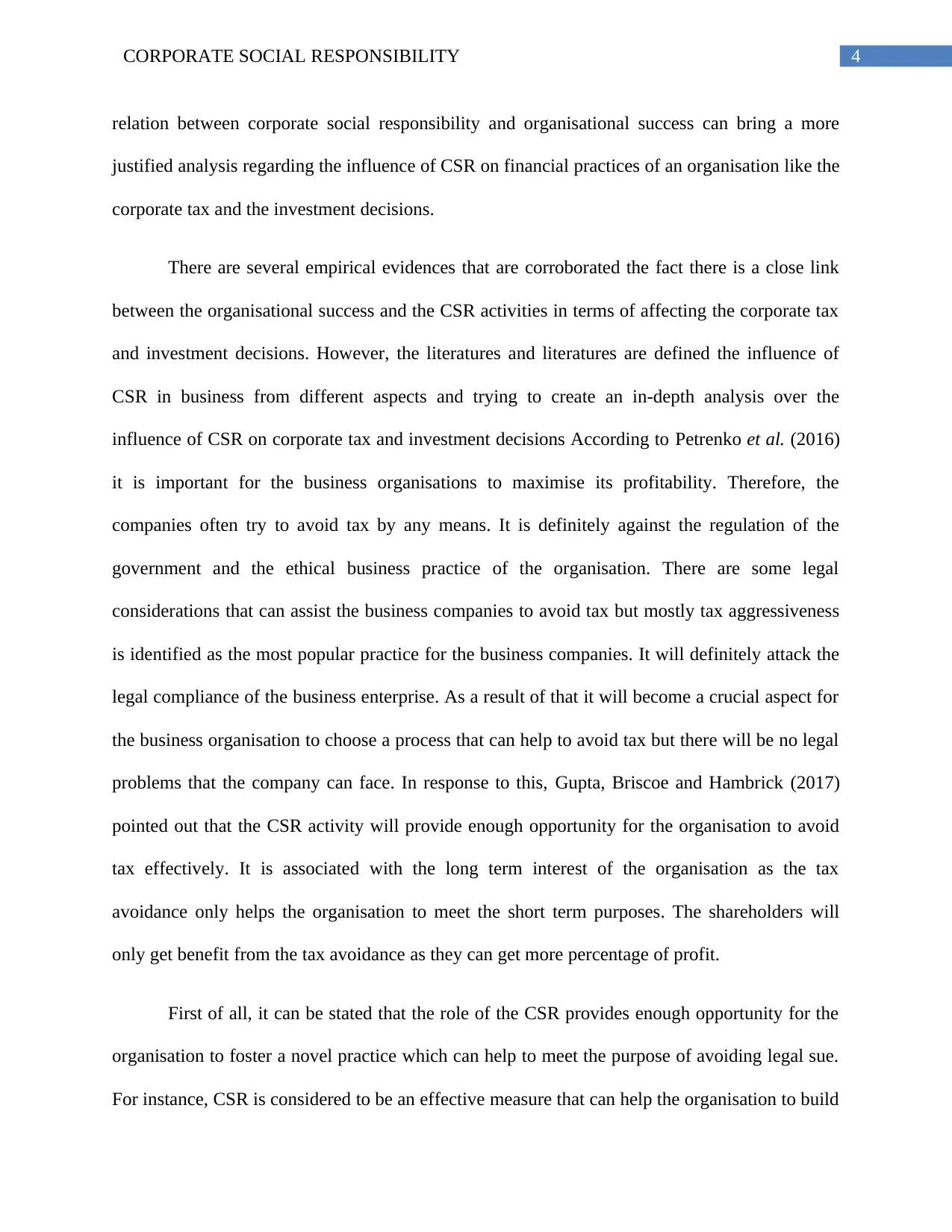
4CORPORATE SOCIAL RESPONSIBILITY
relation between corporate social responsibility and organisational success can bring a more
justified analysis regarding the influence of CSR on financial practices of an organisation like the
corporate tax and the investment decisions.
There are several empirical evidences that are corroborated the fact there is a close link
between the organisational success and the CSR activities in terms of affecting the corporate tax
and investment decisions. However, the literatures and literatures are defined the influence of
CSR in business from different aspects and trying to create an in-depth analysis over the
influence of CSR on corporate tax and investment decisions According to Petrenko et al. (2016)
it is important for the business organisations to maximise its profitability. Therefore, the
companies often try to avoid tax by any means. It is definitely against the regulation of the
government and the ethical business practice of the organisation. There are some legal
considerations that can assist the business companies to avoid tax but mostly tax aggressiveness
is identified as the most popular practice for the business companies. It will definitely attack the
legal compliance of the business enterprise. As a result of that it will become a crucial aspect for
the business organisation to choose a process that can help to avoid tax but there will be no legal
problems that the company can face. In response to this, Gupta, Briscoe and Hambrick (2017)
pointed out that the CSR activity will provide enough opportunity for the organisation to avoid
tax effectively. It is associated with the long term interest of the organisation as the tax
avoidance only helps the organisation to meet the short term purposes. The shareholders will
only get benefit from the tax avoidance as they can get more percentage of profit.
First of all, it can be stated that the role of the CSR provides enough opportunity for the
organisation to foster a novel practice which can help to meet the purpose of avoiding legal sue.
For instance, CSR is considered to be an effective measure that can help the organisation to build
relation between corporate social responsibility and organisational success can bring a more
justified analysis regarding the influence of CSR on financial practices of an organisation like the
corporate tax and the investment decisions.
There are several empirical evidences that are corroborated the fact there is a close link
between the organisational success and the CSR activities in terms of affecting the corporate tax
and investment decisions. However, the literatures and literatures are defined the influence of
CSR in business from different aspects and trying to create an in-depth analysis over the
influence of CSR on corporate tax and investment decisions According to Petrenko et al. (2016)
it is important for the business organisations to maximise its profitability. Therefore, the
companies often try to avoid tax by any means. It is definitely against the regulation of the
government and the ethical business practice of the organisation. There are some legal
considerations that can assist the business companies to avoid tax but mostly tax aggressiveness
is identified as the most popular practice for the business companies. It will definitely attack the
legal compliance of the business enterprise. As a result of that it will become a crucial aspect for
the business organisation to choose a process that can help to avoid tax but there will be no legal
problems that the company can face. In response to this, Gupta, Briscoe and Hambrick (2017)
pointed out that the CSR activity will provide enough opportunity for the organisation to avoid
tax effectively. It is associated with the long term interest of the organisation as the tax
avoidance only helps the organisation to meet the short term purposes. The shareholders will
only get benefit from the tax avoidance as they can get more percentage of profit.
First of all, it can be stated that the role of the CSR provides enough opportunity for the
organisation to foster a novel practice which can help to meet the purpose of avoiding legal sue.
For instance, CSR is considered to be an effective measure that can help the organisation to build
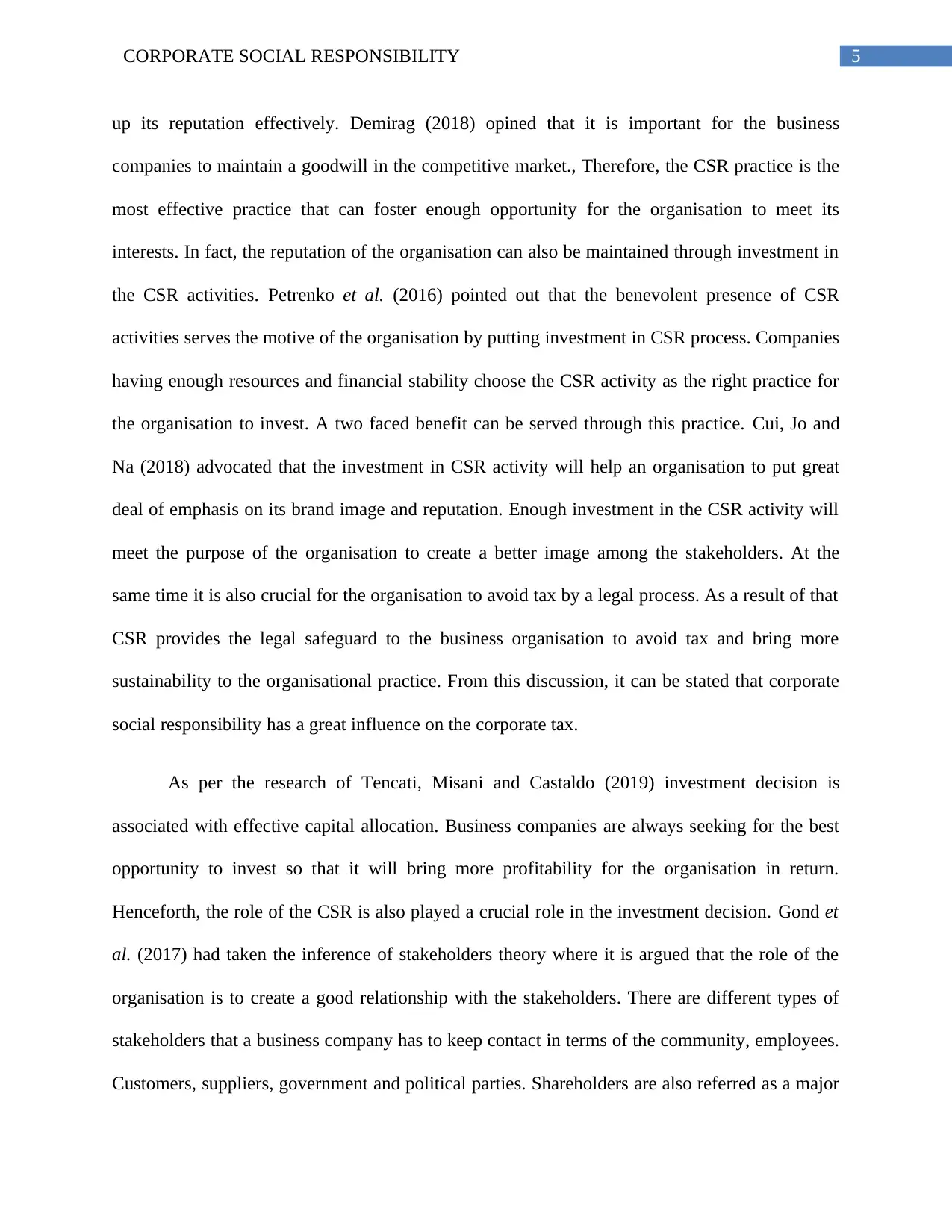
5CORPORATE SOCIAL RESPONSIBILITY
up its reputation effectively. Demirag (2018) opined that it is important for the business
companies to maintain a goodwill in the competitive market., Therefore, the CSR practice is the
most effective practice that can foster enough opportunity for the organisation to meet its
interests. In fact, the reputation of the organisation can also be maintained through investment in
the CSR activities. Petrenko et al. (2016) pointed out that the benevolent presence of CSR
activities serves the motive of the organisation by putting investment in CSR process. Companies
having enough resources and financial stability choose the CSR activity as the right practice for
the organisation to invest. A two faced benefit can be served through this practice. Cui, Jo and
Na (2018) advocated that the investment in CSR activity will help an organisation to put great
deal of emphasis on its brand image and reputation. Enough investment in the CSR activity will
meet the purpose of the organisation to create a better image among the stakeholders. At the
same time it is also crucial for the organisation to avoid tax by a legal process. As a result of that
CSR provides the legal safeguard to the business organisation to avoid tax and bring more
sustainability to the organisational practice. From this discussion, it can be stated that corporate
social responsibility has a great influence on the corporate tax.
As per the research of Tencati, Misani and Castaldo (2019) investment decision is
associated with effective capital allocation. Business companies are always seeking for the best
opportunity to invest so that it will bring more profitability for the organisation in return.
Henceforth, the role of the CSR is also played a crucial role in the investment decision. Gond et
al. (2017) had taken the inference of stakeholders theory where it is argued that the role of the
organisation is to create a good relationship with the stakeholders. There are different types of
stakeholders that a business company has to keep contact in terms of the community, employees.
Customers, suppliers, government and political parties. Shareholders are also referred as a major
up its reputation effectively. Demirag (2018) opined that it is important for the business
companies to maintain a goodwill in the competitive market., Therefore, the CSR practice is the
most effective practice that can foster enough opportunity for the organisation to meet its
interests. In fact, the reputation of the organisation can also be maintained through investment in
the CSR activities. Petrenko et al. (2016) pointed out that the benevolent presence of CSR
activities serves the motive of the organisation by putting investment in CSR process. Companies
having enough resources and financial stability choose the CSR activity as the right practice for
the organisation to invest. A two faced benefit can be served through this practice. Cui, Jo and
Na (2018) advocated that the investment in CSR activity will help an organisation to put great
deal of emphasis on its brand image and reputation. Enough investment in the CSR activity will
meet the purpose of the organisation to create a better image among the stakeholders. At the
same time it is also crucial for the organisation to avoid tax by a legal process. As a result of that
CSR provides the legal safeguard to the business organisation to avoid tax and bring more
sustainability to the organisational practice. From this discussion, it can be stated that corporate
social responsibility has a great influence on the corporate tax.
As per the research of Tencati, Misani and Castaldo (2019) investment decision is
associated with effective capital allocation. Business companies are always seeking for the best
opportunity to invest so that it will bring more profitability for the organisation in return.
Henceforth, the role of the CSR is also played a crucial role in the investment decision. Gond et
al. (2017) had taken the inference of stakeholders theory where it is argued that the role of the
organisation is to create a good relationship with the stakeholders. There are different types of
stakeholders that a business company has to keep contact in terms of the community, employees.
Customers, suppliers, government and political parties. Shareholders are also referred as a major
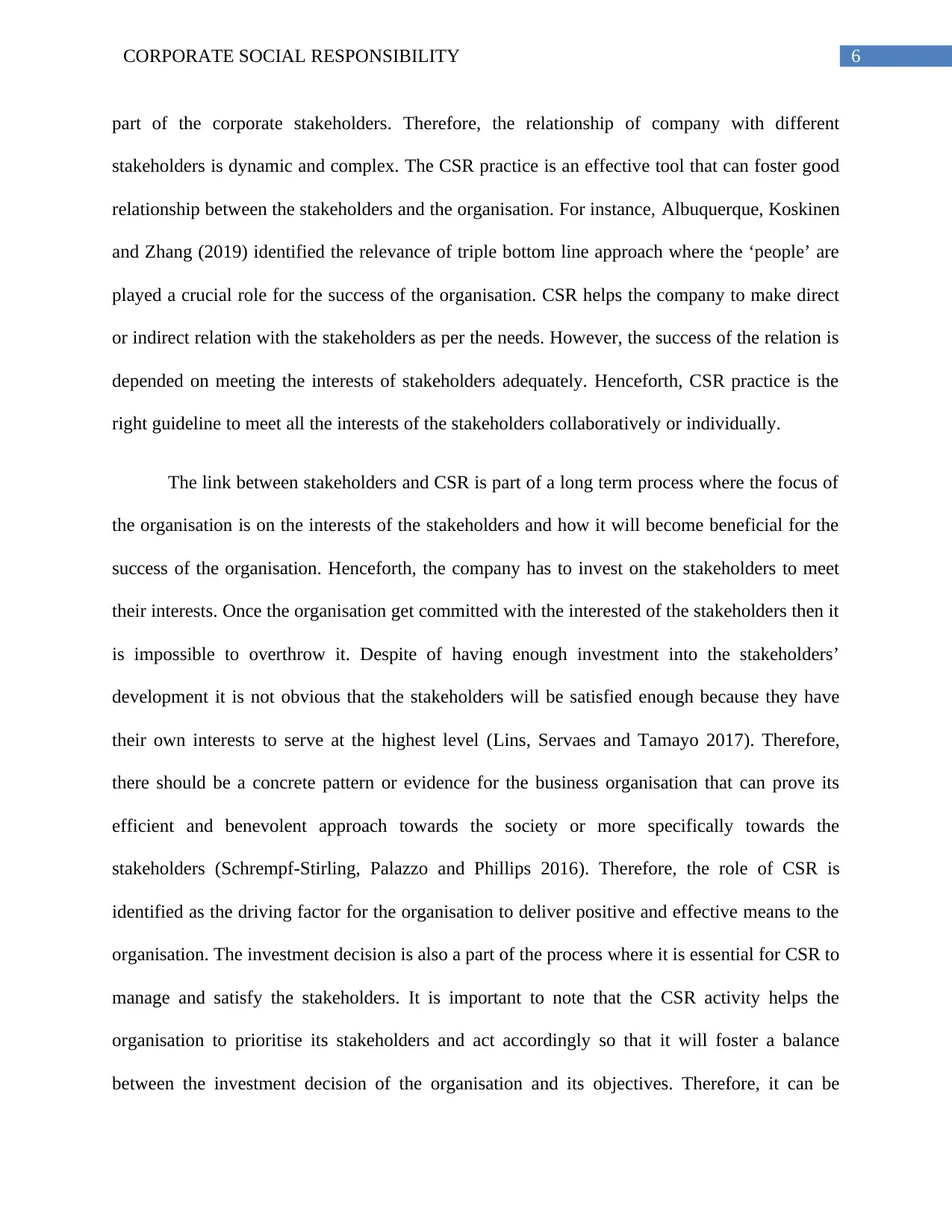
6CORPORATE SOCIAL RESPONSIBILITY
part of the corporate stakeholders. Therefore, the relationship of company with different
stakeholders is dynamic and complex. The CSR practice is an effective tool that can foster good
relationship between the stakeholders and the organisation. For instance, Albuquerque, Koskinen
and Zhang (2019) identified the relevance of triple bottom line approach where the ‘people’ are
played a crucial role for the success of the organisation. CSR helps the company to make direct
or indirect relation with the stakeholders as per the needs. However, the success of the relation is
depended on meeting the interests of stakeholders adequately. Henceforth, CSR practice is the
right guideline to meet all the interests of the stakeholders collaboratively or individually.
The link between stakeholders and CSR is part of a long term process where the focus of
the organisation is on the interests of the stakeholders and how it will become beneficial for the
success of the organisation. Henceforth, the company has to invest on the stakeholders to meet
their interests. Once the organisation get committed with the interested of the stakeholders then it
is impossible to overthrow it. Despite of having enough investment into the stakeholders’
development it is not obvious that the stakeholders will be satisfied enough because they have
their own interests to serve at the highest level (Lins, Servaes and Tamayo 2017). Therefore,
there should be a concrete pattern or evidence for the business organisation that can prove its
efficient and benevolent approach towards the society or more specifically towards the
stakeholders (Schrempf-Stirling, Palazzo and Phillips 2016). Therefore, the role of CSR is
identified as the driving factor for the organisation to deliver positive and effective means to the
organisation. The investment decision is also a part of the process where it is essential for CSR to
manage and satisfy the stakeholders. It is important to note that the CSR activity helps the
organisation to prioritise its stakeholders and act accordingly so that it will foster a balance
between the investment decision of the organisation and its objectives. Therefore, it can be
part of the corporate stakeholders. Therefore, the relationship of company with different
stakeholders is dynamic and complex. The CSR practice is an effective tool that can foster good
relationship between the stakeholders and the organisation. For instance, Albuquerque, Koskinen
and Zhang (2019) identified the relevance of triple bottom line approach where the ‘people’ are
played a crucial role for the success of the organisation. CSR helps the company to make direct
or indirect relation with the stakeholders as per the needs. However, the success of the relation is
depended on meeting the interests of stakeholders adequately. Henceforth, CSR practice is the
right guideline to meet all the interests of the stakeholders collaboratively or individually.
The link between stakeholders and CSR is part of a long term process where the focus of
the organisation is on the interests of the stakeholders and how it will become beneficial for the
success of the organisation. Henceforth, the company has to invest on the stakeholders to meet
their interests. Once the organisation get committed with the interested of the stakeholders then it
is impossible to overthrow it. Despite of having enough investment into the stakeholders’
development it is not obvious that the stakeholders will be satisfied enough because they have
their own interests to serve at the highest level (Lins, Servaes and Tamayo 2017). Therefore,
there should be a concrete pattern or evidence for the business organisation that can prove its
efficient and benevolent approach towards the society or more specifically towards the
stakeholders (Schrempf-Stirling, Palazzo and Phillips 2016). Therefore, the role of CSR is
identified as the driving factor for the organisation to deliver positive and effective means to the
organisation. The investment decision is also a part of the process where it is essential for CSR to
manage and satisfy the stakeholders. It is important to note that the CSR activity helps the
organisation to prioritise its stakeholders and act accordingly so that it will foster a balance
between the investment decision of the organisation and its objectives. Therefore, it can be
Paraphrase This Document
Need a fresh take? Get an instant paraphrase of this document with our AI Paraphraser
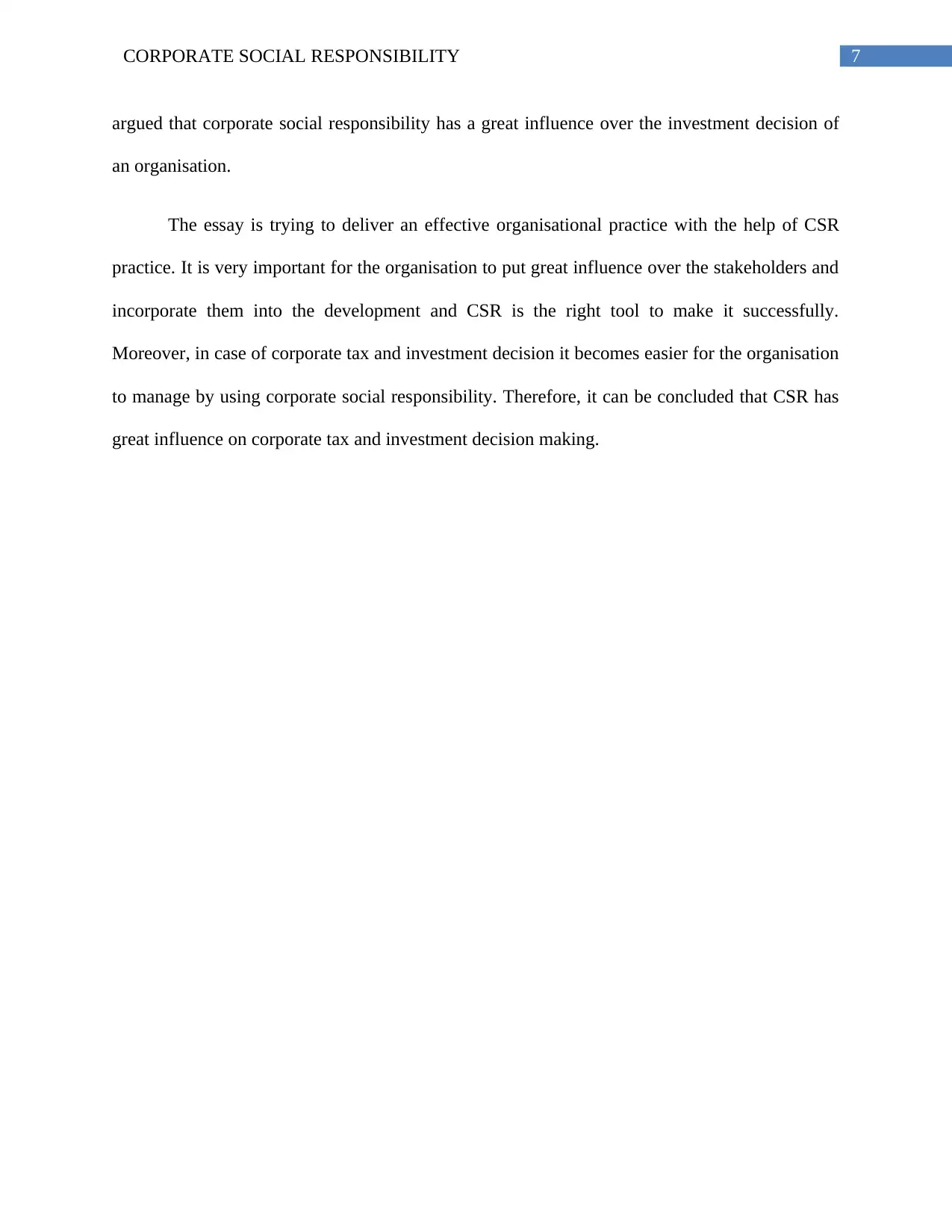
7CORPORATE SOCIAL RESPONSIBILITY
argued that corporate social responsibility has a great influence over the investment decision of
an organisation.
The essay is trying to deliver an effective organisational practice with the help of CSR
practice. It is very important for the organisation to put great influence over the stakeholders and
incorporate them into the development and CSR is the right tool to make it successfully.
Moreover, in case of corporate tax and investment decision it becomes easier for the organisation
to manage by using corporate social responsibility. Therefore, it can be concluded that CSR has
great influence on corporate tax and investment decision making.
argued that corporate social responsibility has a great influence over the investment decision of
an organisation.
The essay is trying to deliver an effective organisational practice with the help of CSR
practice. It is very important for the organisation to put great influence over the stakeholders and
incorporate them into the development and CSR is the right tool to make it successfully.
Moreover, in case of corporate tax and investment decision it becomes easier for the organisation
to manage by using corporate social responsibility. Therefore, it can be concluded that CSR has
great influence on corporate tax and investment decision making.
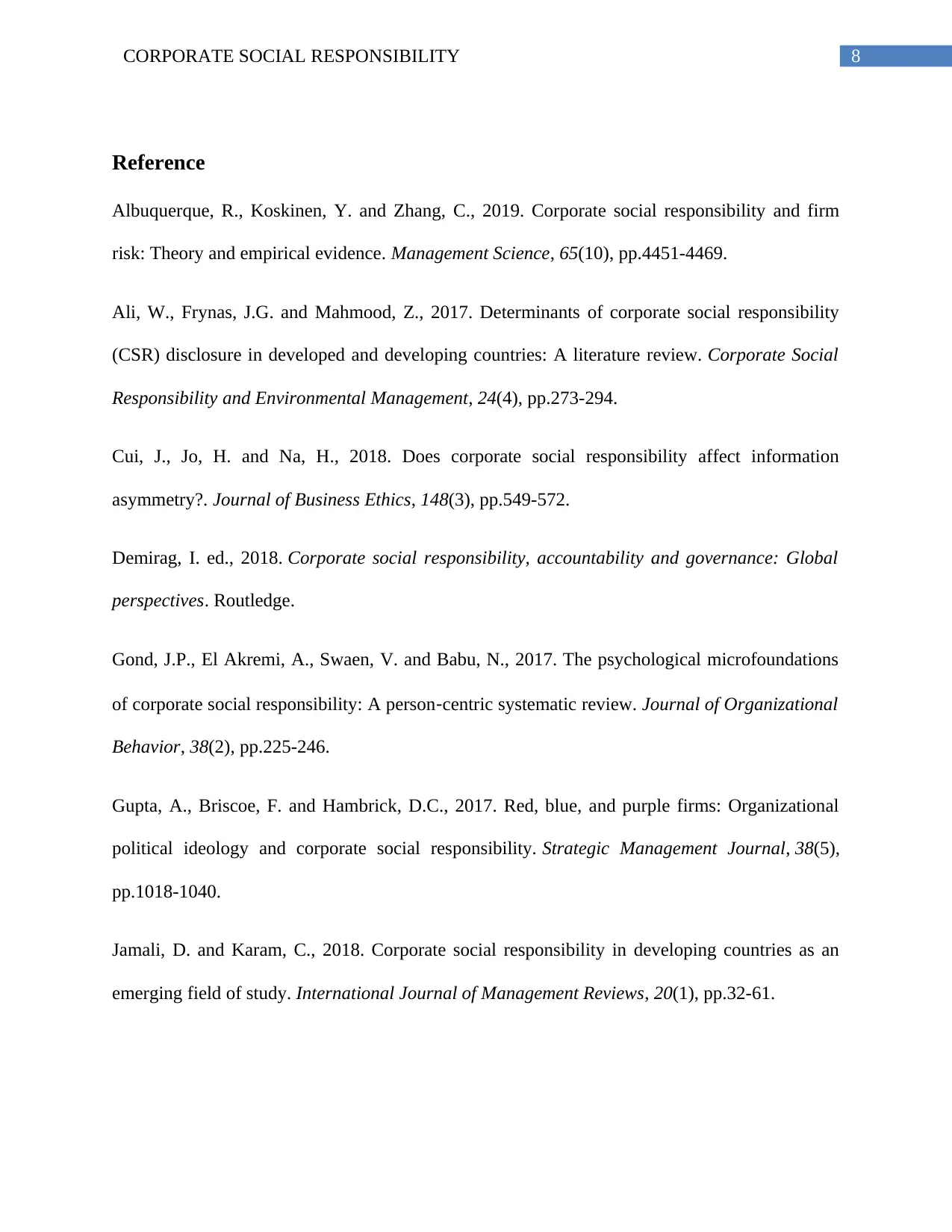
8CORPORATE SOCIAL RESPONSIBILITY
Reference
Albuquerque, R., Koskinen, Y. and Zhang, C., 2019. Corporate social responsibility and firm
risk: Theory and empirical evidence. Management Science, 65(10), pp.4451-4469.
Ali, W., Frynas, J.G. and Mahmood, Z., 2017. Determinants of corporate social responsibility
(CSR) disclosure in developed and developing countries: A literature review. Corporate Social
Responsibility and Environmental Management, 24(4), pp.273-294.
Cui, J., Jo, H. and Na, H., 2018. Does corporate social responsibility affect information
asymmetry?. Journal of Business Ethics, 148(3), pp.549-572.
Demirag, I. ed., 2018. Corporate social responsibility, accountability and governance: Global
perspectives. Routledge.
Gond, J.P., El Akremi, A., Swaen, V. and Babu, N., 2017. The psychological microfoundations
of corporate social responsibility: A person‐centric systematic review. Journal of Organizational
Behavior, 38(2), pp.225-246.
Gupta, A., Briscoe, F. and Hambrick, D.C., 2017. Red, blue, and purple firms: Organizational
political ideology and corporate social responsibility. Strategic Management Journal, 38(5),
pp.1018-1040.
Jamali, D. and Karam, C., 2018. Corporate social responsibility in developing countries as an
emerging field of study. International Journal of Management Reviews, 20(1), pp.32-61.
Reference
Albuquerque, R., Koskinen, Y. and Zhang, C., 2019. Corporate social responsibility and firm
risk: Theory and empirical evidence. Management Science, 65(10), pp.4451-4469.
Ali, W., Frynas, J.G. and Mahmood, Z., 2017. Determinants of corporate social responsibility
(CSR) disclosure in developed and developing countries: A literature review. Corporate Social
Responsibility and Environmental Management, 24(4), pp.273-294.
Cui, J., Jo, H. and Na, H., 2018. Does corporate social responsibility affect information
asymmetry?. Journal of Business Ethics, 148(3), pp.549-572.
Demirag, I. ed., 2018. Corporate social responsibility, accountability and governance: Global
perspectives. Routledge.
Gond, J.P., El Akremi, A., Swaen, V. and Babu, N., 2017. The psychological microfoundations
of corporate social responsibility: A person‐centric systematic review. Journal of Organizational
Behavior, 38(2), pp.225-246.
Gupta, A., Briscoe, F. and Hambrick, D.C., 2017. Red, blue, and purple firms: Organizational
political ideology and corporate social responsibility. Strategic Management Journal, 38(5),
pp.1018-1040.
Jamali, D. and Karam, C., 2018. Corporate social responsibility in developing countries as an
emerging field of study. International Journal of Management Reviews, 20(1), pp.32-61.
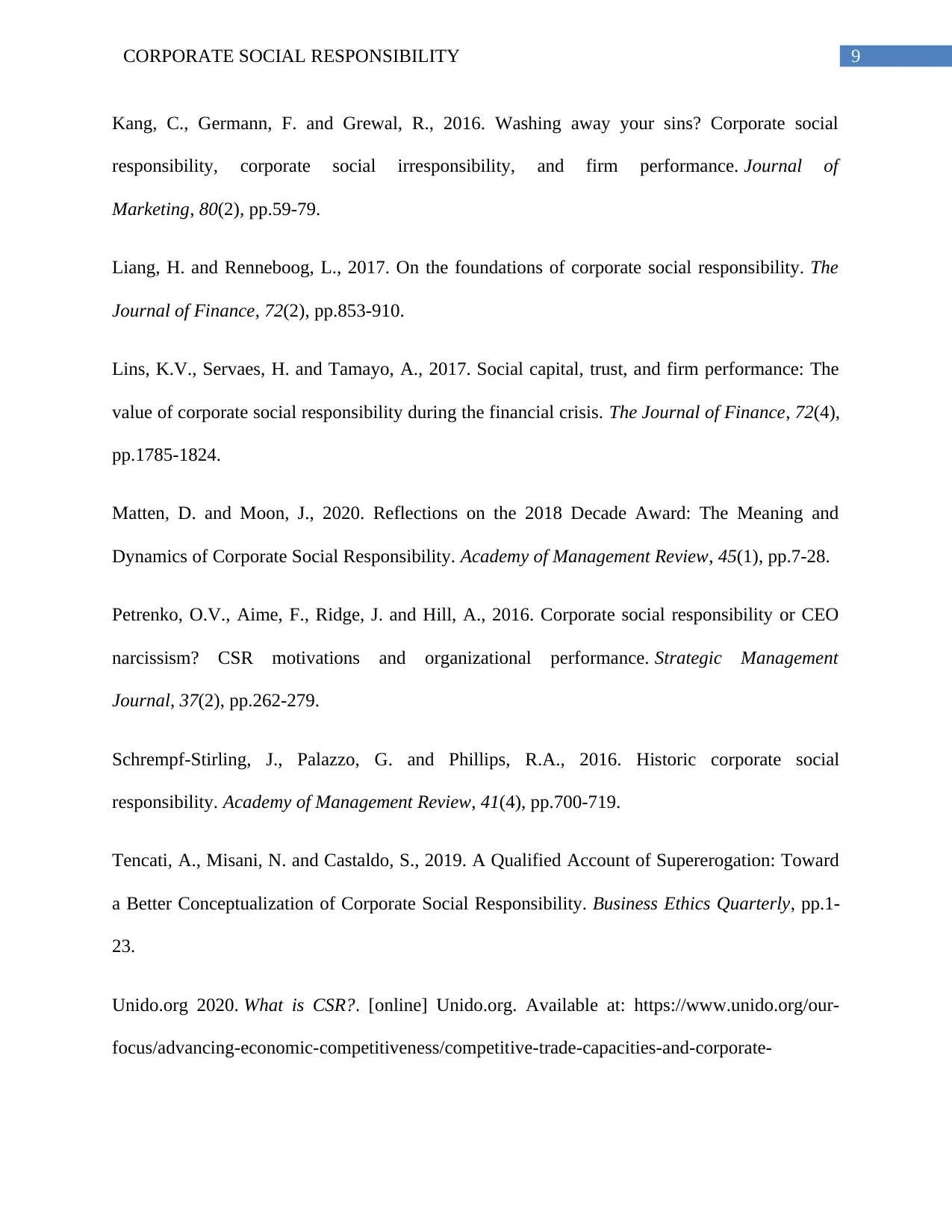
9CORPORATE SOCIAL RESPONSIBILITY
Kang, C., Germann, F. and Grewal, R., 2016. Washing away your sins? Corporate social
responsibility, corporate social irresponsibility, and firm performance. Journal of
Marketing, 80(2), pp.59-79.
Liang, H. and Renneboog, L., 2017. On the foundations of corporate social responsibility. The
Journal of Finance, 72(2), pp.853-910.
Lins, K.V., Servaes, H. and Tamayo, A., 2017. Social capital, trust, and firm performance: The
value of corporate social responsibility during the financial crisis. The Journal of Finance, 72(4),
pp.1785-1824.
Matten, D. and Moon, J., 2020. Reflections on the 2018 Decade Award: The Meaning and
Dynamics of Corporate Social Responsibility. Academy of Management Review, 45(1), pp.7-28.
Petrenko, O.V., Aime, F., Ridge, J. and Hill, A., 2016. Corporate social responsibility or CEO
narcissism? CSR motivations and organizational performance. Strategic Management
Journal, 37(2), pp.262-279.
Schrempf-Stirling, J., Palazzo, G. and Phillips, R.A., 2016. Historic corporate social
responsibility. Academy of Management Review, 41(4), pp.700-719.
Tencati, A., Misani, N. and Castaldo, S., 2019. A Qualified Account of Supererogation: Toward
a Better Conceptualization of Corporate Social Responsibility. Business Ethics Quarterly, pp.1-
23.
Unido.org 2020. What is CSR?. [online] Unido.org. Available at: https://www.unido.org/our-
focus/advancing-economic-competitiveness/competitive-trade-capacities-and-corporate-
Kang, C., Germann, F. and Grewal, R., 2016. Washing away your sins? Corporate social
responsibility, corporate social irresponsibility, and firm performance. Journal of
Marketing, 80(2), pp.59-79.
Liang, H. and Renneboog, L., 2017. On the foundations of corporate social responsibility. The
Journal of Finance, 72(2), pp.853-910.
Lins, K.V., Servaes, H. and Tamayo, A., 2017. Social capital, trust, and firm performance: The
value of corporate social responsibility during the financial crisis. The Journal of Finance, 72(4),
pp.1785-1824.
Matten, D. and Moon, J., 2020. Reflections on the 2018 Decade Award: The Meaning and
Dynamics of Corporate Social Responsibility. Academy of Management Review, 45(1), pp.7-28.
Petrenko, O.V., Aime, F., Ridge, J. and Hill, A., 2016. Corporate social responsibility or CEO
narcissism? CSR motivations and organizational performance. Strategic Management
Journal, 37(2), pp.262-279.
Schrempf-Stirling, J., Palazzo, G. and Phillips, R.A., 2016. Historic corporate social
responsibility. Academy of Management Review, 41(4), pp.700-719.
Tencati, A., Misani, N. and Castaldo, S., 2019. A Qualified Account of Supererogation: Toward
a Better Conceptualization of Corporate Social Responsibility. Business Ethics Quarterly, pp.1-
23.
Unido.org 2020. What is CSR?. [online] Unido.org. Available at: https://www.unido.org/our-
focus/advancing-economic-competitiveness/competitive-trade-capacities-and-corporate-
Secure Best Marks with AI Grader
Need help grading? Try our AI Grader for instant feedback on your assignments.
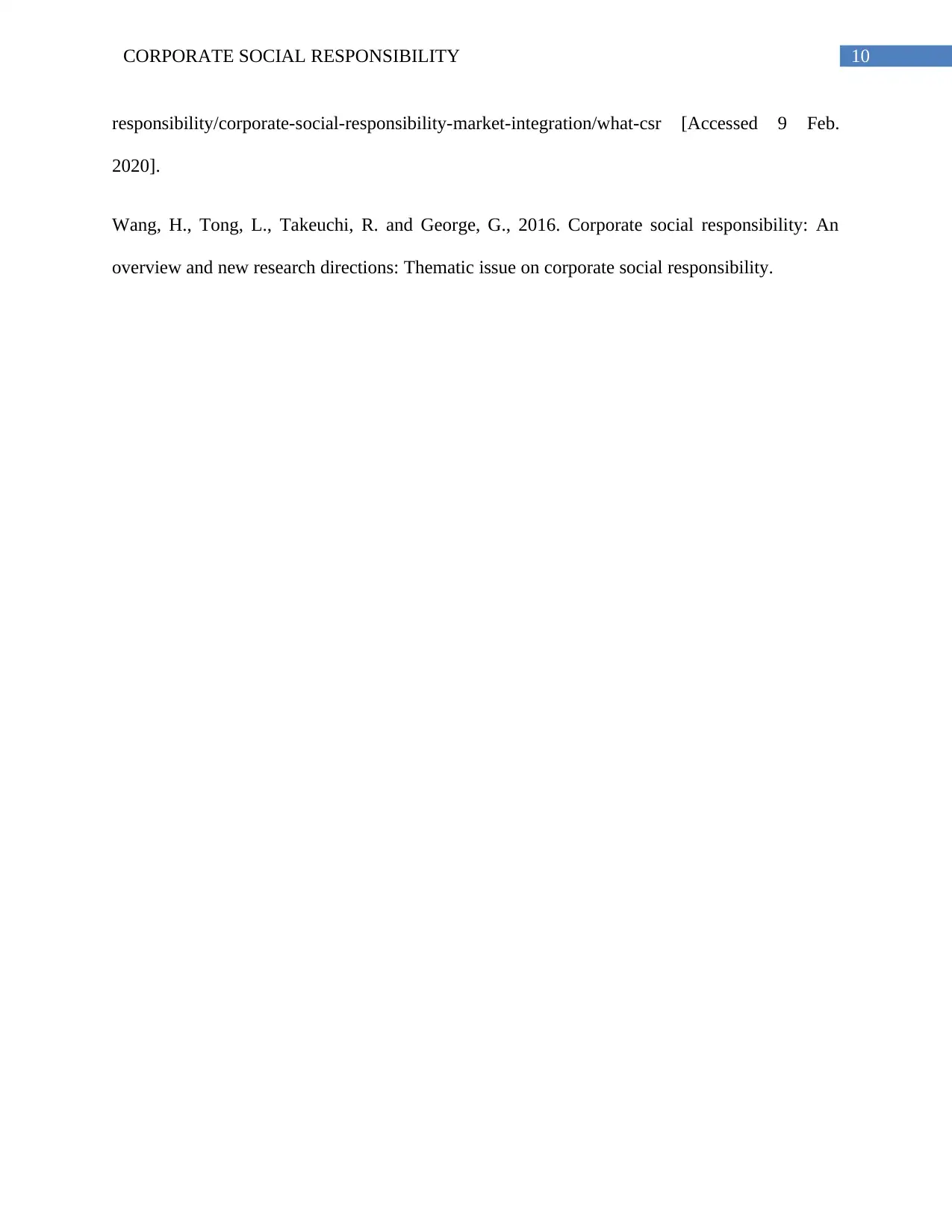
10CORPORATE SOCIAL RESPONSIBILITY
responsibility/corporate-social-responsibility-market-integration/what-csr [Accessed 9 Feb.
2020].
Wang, H., Tong, L., Takeuchi, R. and George, G., 2016. Corporate social responsibility: An
overview and new research directions: Thematic issue on corporate social responsibility.
responsibility/corporate-social-responsibility-market-integration/what-csr [Accessed 9 Feb.
2020].
Wang, H., Tong, L., Takeuchi, R. and George, G., 2016. Corporate social responsibility: An
overview and new research directions: Thematic issue on corporate social responsibility.
1 out of 11
Related Documents
Your All-in-One AI-Powered Toolkit for Academic Success.
+13062052269
info@desklib.com
Available 24*7 on WhatsApp / Email
![[object Object]](/_next/static/media/star-bottom.7253800d.svg)
Unlock your academic potential
© 2024 | Zucol Services PVT LTD | All rights reserved.





